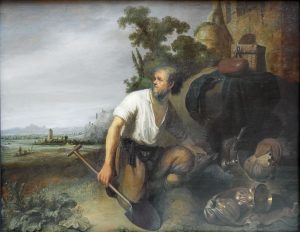Thoughts on Sunday’s Lessons for July 26, 2020
First Reading (Track One): Genesis 29:15-28
The concept of “biblical marriage” gets complicated in Sunday’s Track One first reading.

Parable of the hidden treasure (c.1630), painting, possibly by Rembrandt Harmenszoon van Rijn (1606-1669) or by Gerrit Dou (1613-1675). Museum of Fine Arts, Budapest. (Click image to enlarge.)
First, tricky Jacob gets tricked in his turn by Laban, who puts him to work for seven years to earn Laban’s daughter Rachel as his bride. But then, much to Jacob’s consternation, Laban switches his older daughter, Leah, for Rachel on their wedding night. Only after working for Laban another seven years does Jacob eventually marry Rachel, too. When we consider scripture’s seemingly casual acceptance of arranged, polygamous marriages, with the women given no opportunity to participate or object, it makes little sense to hold up Scripture as the example of a marital ideal. What remains timeless is the celebration of God’s faithfulness, shown in the stories of Abraham, Isaac and Jacob and their descendants who will go on to populate all nations.
First Reading (Track Two): 1 Kings 3:5-12
Known in tradition for his great wisdom, King Solomon may be most often remembered by the story – just a few verses after this one – of how he revealed the real mother in two women’s dispute over a baby by proposing to cut the infant in half. Here in Sunday’s Track Two first reading we meet Solomon – the son of King David and Bathsheba – as the young, new king, uncertain and uneasy. Dreaming of God asking what he would like to be given, Solomon chose not long life, riches or power, but only wisdom to govern the people well. Pleased by this choice, God grants Solomon a wise and discerning mind greater than any earlier or later king.
Psalm (Track One): Psalm 105:1-11, 45b
This Track One Psalm, a ringing hymn of praise to God and God’s works, offers thanksgiving for just the reward that the story of Laban’s daughters foretells: God made an everlasting covenant with Abraham, Isaac and Jacob. God promises that their children would inherit the Promised Land for a thousand generations, in return for their covenant to follow God’s teaching and obey God’s laws.
Alternate Psalm (Track One): Psalm 128
Available as an alternate to the Track One Psalm, this reflects similar ideas without specifically expressing the ancestral covenant. Still, its poetic cadences celebrate the joy and the rewards that come to those who follow in God’s way, the fruits of their labor, the happiness and prosperity that they will inherit. Thanks to God’s blessings from Zion, the Psalmist sings, they will be rewarded with secure homes and long and prosperous lives.
Psalm (Track Two): Psalm 119:129-136
The longest of all the Psalms, Psalm 119’s celebration of love for God’s law and teaching – Torah, the first five books of the Bible – is repeated often in brief selections through the Lectionary year. A different passage was used in Track One just two weeks ago. These verses celebrate the love of Torah in almost sensuous terms of open-mouthed, breathless longing. God’s statutes are so wonderful that the Psalmist sheds streams of tears at the recognition that some people do not follow the law.
Second Reading: Romans 8:26-39
Our extended journey through Paul’s letter to the people of Rome reaches a high point in this passage, as his long discussion contrasting life in the flesh against life in the spirit now comes to its conclusion in a burst of poetic words: If God is for us, who is against us? God’s abiding faithfulness was made manifest through God’s gift of God’s own son. If God gave him up for all of us, nothing in all creation – not hardship, or distress, or persecution, or famine, or nakedness, or peril, or sword – can separate us from the love of God through Jesus.
Gospel: Matthew 13:31-33, 44-52
What is the kingdom of heaven like? Jesus offers us quick, thought-provoking glimpses in a quick series of short parables this week. The kingdom is like a tiny mustard seed that grows into a mighty tree! Or yeast that leavens bread! Or wait, is it like buried treasure? A merchant with an expensive pearl? Fishers with a full net? And there’s that scary threat of the fiery furnace again, with the weeping and gnashing of teeth that awaits evildoers. Parables don’t tell us the whole story – they only offer ideas that flash through our consciousness – but every one of them sparks our imagination about God’s kingdom.
